

Have people become overly dependent on technology? Way too dependent on technology Most kids these days don't even know how to use a dictionary because " Google has it all" so they don't see it as a necessary skill.

Look around at how many people are engrossed in their phones walking down the street, or while driving. Most accidents are caused by people using their phones while driving, whether it be for GPS, to get on Facebook or anything else. It's insane for some people to fathom how anyone ever lived without texting, GPS, and Google. NT%20SoA%20 %20The%20impact%20of%20digital%20technologies%20on%20human%20wellbeing. Has-technology-made-lazy-and-dependent. How many of us could go a week without our cell phone?
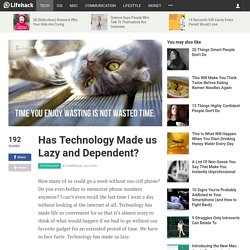
Do you even bother to memorize phone numbers anymore? I can’t even recall the last time I went a day without looking at the internet at all. Is technology making us less human? Over the past few years, scientists, pundits, and armchair psychologists have started questioning technology's effects on our humanity.
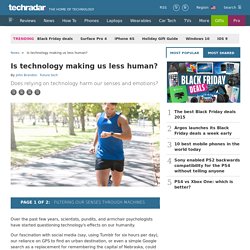
Our fascination with social media (say, using Tumblr for six hours per day), our reliance on GPS to find an urban destination, or even a simple Google search as a replacement for remembering the capital of Nebraska, could be transforming us. Most technologists reckon we're changing for the better.
Our gadgets and gizmos are helping us to connect more with each other, stay alert when we drive, and discover more information. But a few researchers suggest we are changing for the worse. Have people become overly dependent on technology? Technology - a dangerous dependency? Technology enables us to do things that were previously unimaginable, and has certainly made many tasks far easier than they were before.

But is also enables us to display previously unimaginable feats of stupidity. It is possible then, that technology is actually holding us back as individuals, rather than propelling us forward. Or given its current omnipresence, could it actually be taking over? AIQ - Smart Clothing. Intel iQ – Wonderful things happen when wearable tech and smart clothing collide. When you think of wearable technology, you might think of fitness bands like the Jawbone UP3 and smartwatches like the Basis Peak.
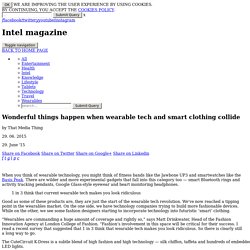
There are wilder and more experimental gadgets that fall into this category too — smart Bluetooth rings and activity tracking pendants, Google Glass-style eyewear and heart monitoring headphones. 1 in 3 think that current wearable tech makes you look ridiculous Good as some of these products are, they are just the start of the wearable tech revolution. We’ve now reached a tipping point in the wearables market. On the one side, we have technology companies trying to build more fashionable devices. “Wearables are commanding a huge amount of coverage and rightly so,” says Matt Drinkwater, Head of the Fashion Innovation Agency at London College of Fashion.
UniMorph - Rapid digital fabrication of film shape-changing interfaces / @medialab. Created by Felix Heibeck, Basheer Tome and Clark Della Silva with supervision from Hiroshi Ishii at the MIT’s Tangible Media Group, uniMorph is an enabling technology for rapid digital fabrication of customized thin-film shape-changing interfaces.
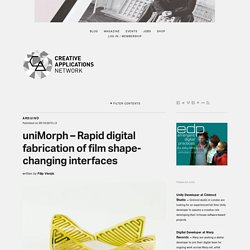
Working with easily available materials and reproducible techniques, uniMorph project leverages the simple unimorph actuation principle that can be found in bi-metals and combines it with the thermoelectric characteristics of copper and the vastly different thermal expansion rate of ultra-high molecular weight polyethylene (UHMW PE) and Kapton. uniMorph enables passive and active shape-actuation of thin flexible sheets and circuits.
Passive actuation can leverage access heat, like the heat from a lightbulb, to create simple shape transformations. BioLogic material opens and closes in response to humidity. Teams from MIT Media Lab and the Royal College of Art have used bacteria to design a "bio-skin" fabric that peels back in reaction to sweat and humidity (+ slideshow).

The BioLogic fabric relies on bacteria reportedly discovered 1,000 years ago by a Japanese samurai. The Bacillus Subtilis microorganism has since been used to ferment foods in Japan, including natto – a soybean-based dish. Teams from the MIT Media Lab's Tangible Media Group and Royal College of Art have used the bacteria's ability to expand and contract in reaction to moisture, and developed a method for incorporating it into material that can be used for garments. 1426155577.7153Smart%20Clothing %20a%20new%20life. 334094. Career Opportunities. Hello!

Thank you for your interest in our TJX Europe Graduate & Placement Programmes, and welcome to our Talent Management System. To start your adventure, simply make sure your language at the top right of this page is set to English UK, and then click View Jobs to the left, which will display all the programmes we’re currently recruiting for. To keep up with the latest news and to have a chat, why not like our Facebook page – Graduates at TJX Europe! We wish you the best of luck with your application, and if you have any questions please email us at graduate_recruitment@tjxeurope.com. Many thanks, European Graduate Recruitment Team TJX Europe Please note, if your language is set as English UK, you've clicked on View Jobs, and the programme you’re looking for doesn’t appear, unfortunately this means we will have finished recruiting for 2016; however applications for our 2017 programmes will open in September 2016.
Artist Statement - de Koninck. Sasha. Portfolio. Research + Design: Sound + Textile My work is a presentation of a multisensory experience, through the research and development of smart textile material for the body that is intimate, sensitive and loud.
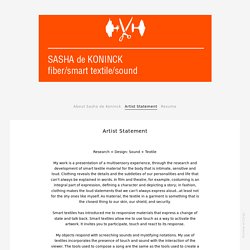
Untitled. 1426155577.7153Smart%20Clothing %20a%20new%20life. Problem loading page. CES Innovation Awards - CES 2016. How We Judge Each product category has a three-member judging team comprised of an independent industrial designer, an independent engineer and a member of the trade press.

The three-member judging team gives a numerical value to each of the below criteria. The scores are combined, resulting in a cumulative score for each product. A baseline value is derived from the cumulative scores in a category. All scores above the baseline are designated as Honorees. The Best of Innovation Award will be awarded to the highest-rated product in each category, as long as that product surpasses a previously-determined minimum score.
Entries are evaluated on the following criteria: General Entries 1. Homepage - Noble Biomaterials. Clothing + - Frontpage. Forget Apple Watch: Smart Clothing is the Next Big Thing. Smartwatches and fitness bands are one of the hottest products of 2014. We’ve seen a dizzying array of watches from many major manufacturers, and fitness bands released by some of the biggest tech firms in the world. The wearable tech trend isn’t about to disappear. The wearable tech trend isn’t about to disappear, and industry analysts are predicting considerable growth over the coming years; but how many more fitness bands, and in how many different shapes and sizes, can we really expect to see? According to research from tech analysts Gartner, smartwatches will be more popular that fitness bands in 2015, with the market growing from 18 million sold this year, to 21 million.
But watches aren’t where wearables end. CES 2015 hints at the garments to come. The best smart clothing: From biometric shirts to mood sensing dresses. Smart Clothing - Connectedly Forum. Sherry Turkle: Connected, but alone? Connecting With Sherry Turkle: My Q and A With the Author of 'Reclaiming Conversation' Sherry Turkle is Professor of the Social Studies of Science and Technology at MIT, and her new book Reclaiming Conversation: The Power of Talk in a Digital Age cements her status as one of our pre-eminent thinkers on the ways technology impacts on our lives. In answer to my questions, she shared her insights on our capacity for solitude and empathy, how our phones affect our ability to truly connect with each other, and the difference between being anti-technology and pro-conversation.
Your work over the past few years has focused on how we are constantly connecting with one another via our devices. If we're always communicating, what's wrong with our conversation? My research shows that we are too busy connecting to have the conversations that count, the kind of conversation in which we give each other our full attention, the kind where we allow an idea to develop, where we allow ourselves to be vulnerable. Sherry Turkle: 'We're losing the raw, human part of being with each other' Bedraggled from a walk in the rain, Sherry Turkle shows up begging for a latte. She's left her wallet in her hotel room. She's exhausted, she says, and could do with a coffee. Sherry Turkle.